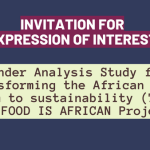Kampala, Uganda – [May 3, 2024] – The Alliance for Food Sovereignty in Africa (AFSA), representing a coalition of 41 African civil society organizations, today issued a call for revision of the African Union’s proposed 10-year Fertilizer and Soil Health Action Plan 2023-2033. As a voice for over 200 million stakeholders across Africa, including smallholder farmers, pastoralists, indigenous peoples, and agroecological entrepreneurs, AFSA expresses reservations about the approaches endorsed in the proposed 10-year Action Plan.
The AU action plan’s strong emphasis on the extensive use of mineral fertilizers, hybrid seeds, and agrochemicals is seen by AFSA as a continuation of outdated and potentially harmful practices. These methods misinterpret the real challenges of soil health and risk exacerbating soil degradation, threatening food security, public health, and crucial seed diversity in Africa.
Dr. Million Belay, AFSA General Coordinator, emphasized, “Civil society has a pivotal role in the fertilizer and soil health debate, not only by linking actors across the value chain but by questioning narratives that threaten seed diversity, nutrition, health, and environmental integrity. It’s disconcerting that African civil society was not consulted in the planning of the African Fertilizer and Soil Health Summit nor in the formulation of its 10-year plan.”
AFSA advocates for a shift towards agroecology, which integrates local knowledge with scientific innovation to restore biodiversity and build resilient food systems. However, the current plan marginalizes these sustainable approaches, misleadingly presenting agroecology as supplementary rather than a standalone solution capable of addressing Africa’s food security challenges comprehensively.
Ferdinand Wafula of Bio Gardening Innovations, Kenya added, “We need to take care of our soils for future generations. There is the African saying: ‘We borrow land from our children.’ We urge policymakers, governments, and donors to provide more funding to these alternatives because they mitigate a huge number of issues ranging from nutrition challenges to climate crisis and the escalating prices for commodities.” He added “Africa is not a monoculture. We want a diversity of diverse crops using ecological methods. Synthetic materials kill microorganisms. If they kill that, we cultivate on dead soil. Dead soil does not give us nutrition.”
AFSA points out that the proposed 10-year plan exacerbates economic strains by increasing dependency on expensive imported fertilizers, enriching a handful of fertilizer companies while African farmers face soaring costs. This economic imbalance underscores a misplaced priority that benefits industrial agriculture corporations more than it aids the smallholder farmers of Africa.
AFSA’s Recommendations for Transformative Change
- Focus on Agroecology: Governments and policymakers are urged to recognize agroecology’s potential for enhancing food security and reducing poverty while conserving biodiversity and incorporating indigenous knowledge. Agroecological systems can match or exceed industrial agriculture outputs, particularly under environmental stress.
- Invest in Agroecological Research and Services: Funding should be directed towards agroecological research and extension services to support sustainable farming, biodiversity conservation, and climate resilience. Emphasis should be on participatory research methods that involve farmers in knowledge creation and adapt agricultural techniques to local conditions.
- Promote Bio-fertilizer Production: Encourage the replacement of chemical fertilizers with bio-fertilizers and organic inputs. This shift will reduce reliance on foreign inputs and prevent increasing debt from fertilizer imports.
- Involve Farmers and Civil Society: Ensure that agriculture strategy development includes farmers and civil society to meet the real needs of small-scale farmers and strengthen the food system
While AFSA agrees with the AU on the urgent need to address land degradation and restore soil biodiversity, the current push to increase chemical inputs is a misguided agenda that profits corporations at the expense of smallholder African farmers. AFSA calls for a comprehensive reevaluation of the Fertilizer and Soil Health Action Plan to focus on empowering farmers, protecting biodiversity, and building resilient food systems through agroecological and locally adapted practices.
READ THE FULL AFSA STATEMENT HERE
MEDIA CONTACTS
Anne Maina, Biodiversity and Biosafety Association of Kenya / anne.maina@bibakenya.org
Ferdinand Wafula, Bio Gardening Innovations / biogardeninginnov@yahoo.com
Charles Tumuhe, AFSA Program Officer, Healthy Soil,Healthy Food / Charles.tumuhe@afsafrica.org
ABOUT AFSA
The Alliance for Food Sovereignty in Africa (AFSA) is a continental coalition of civil society organizations dedicated to advancing the causes of food sovereignty and agroecology across the African continent. Our alliance comprises diverse entities, including African food producer networks, African CSO networks, indigenous people’s organizations, faith-based organizations, women and youth groups, consumer movements, and international organizations aligned with AFSA’s mission. AFSA is a ‘network of networks’ with 41 member organizations active in 50 African countries, impacting approximately 200 million individuals.


































[…] PRESS RELEASE: AFSA Calls For Transformative Changes In African Fertilizer And Soil Health Policies […]